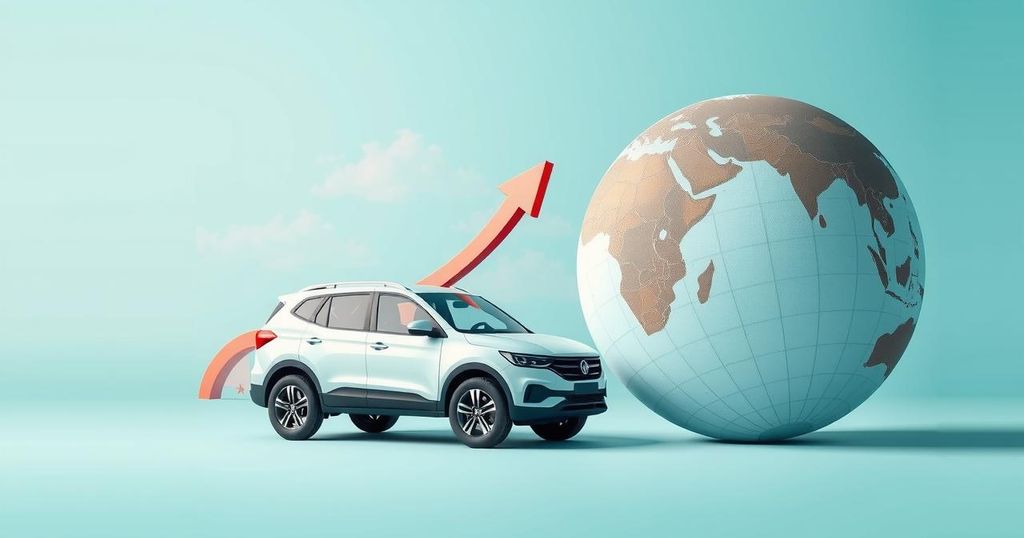Cars
AFRICA, AUTOMOTIVE INDUSTRY, CYRIL RAMAPHOSA, DEPARTMENT, DEPARTMENT OF TRADE, INDUSTRY AND COMPETITION, DONALD TRUMP, DTIC, FOREIGN INVESTMENT, NORTH AMERICA, PAUL, PAULINA MAMOGOBO, PRETORIA, SOUTH AFRICA, SUPPLY CHAIN, TARIFFS, TRADE, UNITED STATES, US, VOLKSWAGEN AG, WASHINGTON
Marisol Gonzalez
0 Comments
South Africa Engages US Amid Imminent Tariffs on Automotive Imports
South Africa’s trade ministry is initiating talks with the US due to a 25% import tariff on automobiles, effective April 3. This development threatens local manufacturers and the economy, as it could nullify duty-free access under the African Growth and Opportunity Act (AGOA). The government is considering a bilateral trade agreement as an alternative to AGOA to improve relations amidst increasing diplomatic tensions with Washington.
South Africa’s trade ministry is initiating discussions with the United States regarding new tariffs imposed on automobile imports, where a 25% levy will be effective starting April 3. This duty threatens local manufacturers and the overall economy, as South African vehicles currently receive duty-free access due to a preferential trade agreement. The trade ministry highlighted potential adverse impacts from these tariffs, stating they could significantly affect the nation’s economic landscape.
The recent tariffs, introduced by the Trump administration, aim to address perceived national security threats, exacerbating tensions between South Africa and the US. This situation raises concerns for trade agreements, especially the African Growth and Opportunity Act (AGOA), under which a significant portion of South African goods enter the US without duties.
In 2022, automotive exports from South Africa represented 64% of its shipments to the US through AGOA, valued at approximately $2.4 billion. The country’s automotive sector contributes over 5% to its GDP and employs upwards of 116,000 individuals. Despite this, South Africa’s auto exports account for only 0.99% of total US vehicle imports, leading the trade ministry to assert that they do not pose a risk to the US industry.
The Department of Trade, Industry and Competition (DTIC) expressed concerns that the new tariffs would likely apply to South African shipments under AGOA, as similar duties on steel and aluminum have overridden existing trade preferences. The US has utilized the Trade Expansion Act of 1962’s section 232 to justify these tariffs on national security grounds.
The Automotive Business Council (Naamsa), which includes major manufacturers like Volkswagen AG and Toyota Motor Corp., is working with the DTIC to advocate for an exemption from these tariffs. Furthermore, the South African government is strategizing to propose a bilateral trade agreement if its preferential access to the US market is rescinded, considering this approach preferable to AGOA.
In light of deteriorating diplomatic relations since Trump resumed office, South Africa aims to reassess its standing with the US. The US has expressed discontent regarding South Africa’s foreign relations, particularly concerning Iran and the International Court of Justice case involving alleged genocide related to Israel’s actions in Gaza.
In conclusion, South Africa is proactive in seeking negotiations with the United States regarding impending tariffs that threaten its automobile industry’s viability. The looming 25% levy, coupled with strained diplomatic relations, necessitates a reassessment of trade agreements, particularly AGOA. The South African government is prepared to advocate for a favorable bilateral trade accord as it navigates these challenges, aiming to maintain and strengthen its economic ties with the US.
Original Source: www.newzimbabwe.com




Post Comment